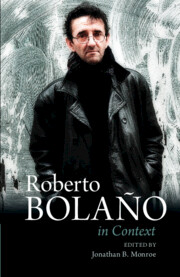Book contents
- Roberto Bolaño in Context
- Roberto Bolaño in Context
- Copyright page
- Contents
- Contributors
- Chronology
- Part I Geographical, Social, and Historical Contexts
- Part II Shaping Events and Literary History
- Part III Genres, Discourses, Media
- Part IV Aesthetics, Culture, and Politics
- Chapter 23 The Abomination of Literature
- Chapter 24 Religion and Politics
- Chapter 25 Gender and Sexuality
- Chapter 26 Race and Ethnicity
- Chapter 27 Trauma and Collective Memory
- Chapter 28 Fictions of the Avant-Gardes
- Chapter 29 Love and Friendship
- Chapter 30 World Literature: Twenty-First-Century Legacies
- Further Reading
- Index
Chapter 26 - Race and Ethnicity
from Part IV - Aesthetics, Culture, and Politics
Published online by Cambridge University Press: 15 December 2022
- Roberto Bolaño in Context
- Roberto Bolaño in Context
- Copyright page
- Contents
- Contributors
- Chronology
- Part I Geographical, Social, and Historical Contexts
- Part II Shaping Events and Literary History
- Part III Genres, Discourses, Media
- Part IV Aesthetics, Culture, and Politics
- Chapter 23 The Abomination of Literature
- Chapter 24 Religion and Politics
- Chapter 25 Gender and Sexuality
- Chapter 26 Race and Ethnicity
- Chapter 27 Trauma and Collective Memory
- Chapter 28 Fictions of the Avant-Gardes
- Chapter 29 Love and Friendship
- Chapter 30 World Literature: Twenty-First-Century Legacies
- Further Reading
- Index
Summary
Like the texts of many other major Latin American authors, those of Roberto Bolaño that deal explicitly with race and ethnicity are relatively few. However, one can mention among these such key novels as The Third Reich, published in 2010, but written in 1989, Distant Star published in 1996, The Savage Detectives (1998), By Night in Chile (2003) and his posthumous magnus opus 2666 (2004). Passages and characters in these novels seem to dialogue with contemporary theorizations on race. Underlying his narrative is an acute awareness of the imbrication between fascism, contemporary violence and racism, and the processes of colonization that helped define Latin American cultures and societies.
- Type
- Chapter
- Information
- Roberto Bolaño In Context , pp. 294 - 302Publisher: Cambridge University PressPrint publication year: 2023

